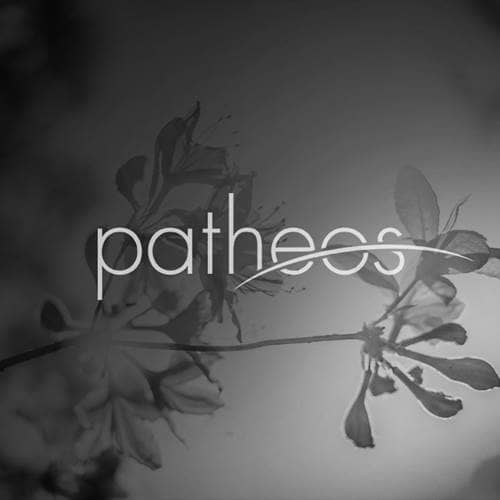- Trending:
- Pope Leo Xiv
- |
- Israel
- |
- Trump
- |
- Social Justice
- |
- Peace
- |
- Love
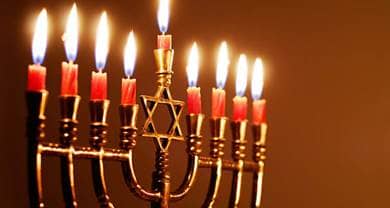
RELIGION LIBRARY
Judaism
Rites and Ceremonies
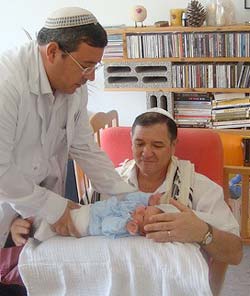 The most important, primal, and very first rite of Judaism—both in terms of its historical origins and occasion in life—is the circumcision of all baby boys at the age of eight days. This ritual was initiated when God commanded the first Jewish patriarch, Abraham, to circumcise himself, all the male members of his household, and all his descendants as an eternal sign of the Divine Covenant between God and Abraham's progeny, the "chosen people."
The most important, primal, and very first rite of Judaism—both in terms of its historical origins and occasion in life—is the circumcision of all baby boys at the age of eight days. This ritual was initiated when God commanded the first Jewish patriarch, Abraham, to circumcise himself, all the male members of his household, and all his descendants as an eternal sign of the Divine Covenant between God and Abraham's progeny, the "chosen people."
Since biblical times, the rite of circumcision has been the most primal and essential rite of entry into the Jewish community. So, for example, the uncircumcised were prohibited from participating in the very first and most important sacrament of ancient Judaism, the sacrifice of the Paschal Lamb on the eve of the Israelites' Exodus from Egypt. In the rabbinic tradition, one who is not circumcised is "cut off" from both the community of Israel in this life and from enjoying his "portion in the world to come." The soul of the uncircumcised Jew is believed to perish with his body, and he will not experience the anticipated resurrection of the dead at the end of days that will accompany the messianic era. A specially trained ritual surgeon, known as a mohel, performs this rite, which includes a ceremony in which the baby is given his Hebrew name, followed by a celebratory feast. Girls, who are not circumcised, are commonly named in a synagogue ceremony on Sabbath morning, usually within thirty days after their birth.
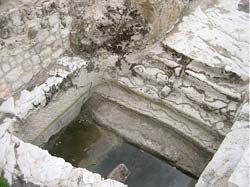 In ancient Israelite religion, there was an elaborate system of laws intended to maintain ritual purity, largely in relation to the cult of sacrificial worship in the Jerusalem Temple. While most of the ancient regulations regarding personal purity and cleanliness fell into abeyance with the Temple's destruction, two vital aspects of the laws of purity, derived from the "code of holiness" in the biblical Book of Leviticus, have remained in full force to this day: the dietary laws, or kashrut, that prohibit the consumption of any of the species of animals, birds, and fish classified by scripture as unclean; and the laws of family purity (taharat ha-mishpacha) that require menstruating women to avoid intimate contact with their husbands until a week after the end of their period and following their immersion in a mikvah, or ritual bath. The mikvah is also used by some Orthodox Jewish men, mainly the Hasidim, on the eve of Shabbat and Jewish holidays, and by all Orthodox men and women on the eve of the Day of Atonement (Yom Kippur) to purify themselves before these Holydays. Converts to Judaism are also immersed in the mikvah as a symbol of their re-birth as members of the Jewish community.
In ancient Israelite religion, there was an elaborate system of laws intended to maintain ritual purity, largely in relation to the cult of sacrificial worship in the Jerusalem Temple. While most of the ancient regulations regarding personal purity and cleanliness fell into abeyance with the Temple's destruction, two vital aspects of the laws of purity, derived from the "code of holiness" in the biblical Book of Leviticus, have remained in full force to this day: the dietary laws, or kashrut, that prohibit the consumption of any of the species of animals, birds, and fish classified by scripture as unclean; and the laws of family purity (taharat ha-mishpacha) that require menstruating women to avoid intimate contact with their husbands until a week after the end of their period and following their immersion in a mikvah, or ritual bath. The mikvah is also used by some Orthodox Jewish men, mainly the Hasidim, on the eve of Shabbat and Jewish holidays, and by all Orthodox men and women on the eve of the Day of Atonement (Yom Kippur) to purify themselves before these Holydays. Converts to Judaism are also immersed in the mikvah as a symbol of their re-birth as members of the Jewish community.
 Judaism has extensive customs and rites for mourning the loss of a relative. Burial is to take place as quickly as possible, ideally less than twenty-four hours after death. The body is ritually cleansed by volunteers from a community organization known as the chevra kadisha, or Holy Society, and buried is white shrouds—and, in the case of men, in the tallit, or fringed prayer-shawl, with one fringe removed to render it unfit for ritual use. Jewish law strictly prohibits the use of any materials that are not completely degradable, such as metal, in the construction of the burial casket, and religious Jews are typically buried in a simple pine box, with no nails, hinges, or decorations. Sefardic, or Oriental Jews, hailing from Muslim lands, bury their dead in shrouds and avoid the use of caskets.
Judaism has extensive customs and rites for mourning the loss of a relative. Burial is to take place as quickly as possible, ideally less than twenty-four hours after death. The body is ritually cleansed by volunteers from a community organization known as the chevra kadisha, or Holy Society, and buried is white shrouds—and, in the case of men, in the tallit, or fringed prayer-shawl, with one fringe removed to render it unfit for ritual use. Jewish law strictly prohibits the use of any materials that are not completely degradable, such as metal, in the construction of the burial casket, and religious Jews are typically buried in a simple pine box, with no nails, hinges, or decorations. Sefardic, or Oriental Jews, hailing from Muslim lands, bury their dead in shrouds and avoid the use of caskets.
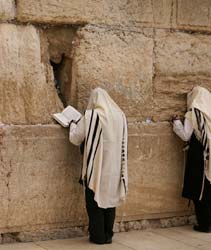 Following the burial, immediate relatives of the deceased return home to observe a week of mourning, known as shiva (from the Hebrew word for seven), in which they receive visitors who come to comfort, feed, and otherwise sustain the spirits of the bereaved, as well as to provide for a minyan in order to conduct the thrice-daily prayers in the shiva home. Mourners are not supposed to work or even to cook for themselves during this week. Following the end of shiva, a period of less intense mourning is continued during which the bereaved are prohibited from participating in public celebrations, such as weddings parties or musical concerts. Men are prohibited from shaving during the first thirty days of mourning, known as sheloshim. The memorial prayer, known as Kaddish, is recited at all three daily services (provided a minyan is present) by those mourning the loss of parents for eleven months following the funeral.
Following the burial, immediate relatives of the deceased return home to observe a week of mourning, known as shiva (from the Hebrew word for seven), in which they receive visitors who come to comfort, feed, and otherwise sustain the spirits of the bereaved, as well as to provide for a minyan in order to conduct the thrice-daily prayers in the shiva home. Mourners are not supposed to work or even to cook for themselves during this week. Following the end of shiva, a period of less intense mourning is continued during which the bereaved are prohibited from participating in public celebrations, such as weddings parties or musical concerts. Men are prohibited from shaving during the first thirty days of mourning, known as sheloshim. The memorial prayer, known as Kaddish, is recited at all three daily services (provided a minyan is present) by those mourning the loss of parents for eleven months following the funeral.
Study Questions:
1. Why was circumcision an important indicator of Jewish identity?
2. What is kashrut? How does it create a sense of the sacred?
3. How is the mikvah a part of Jewish ritual?
4. What rites are associated with death?








